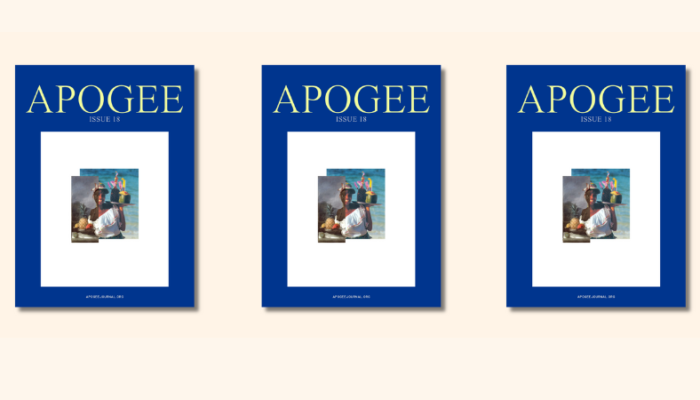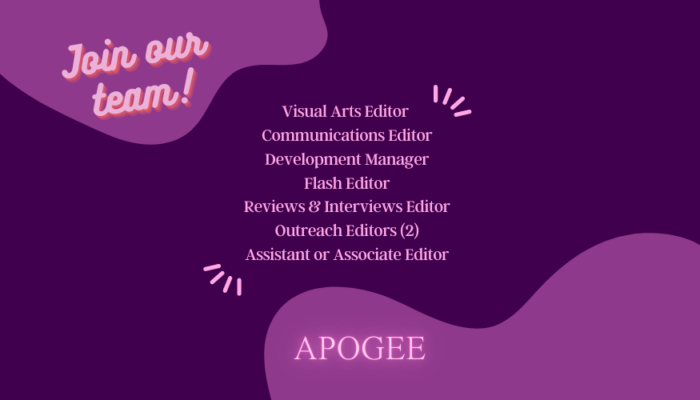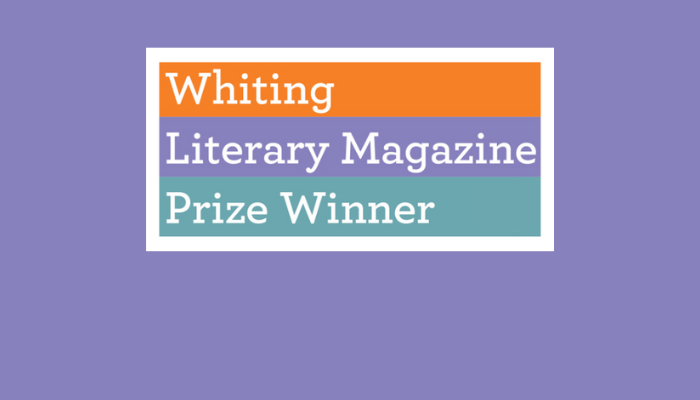Apogee Journal is excited to welcome Esmé-Michelle Watkins as our newest Fiction Editor on our editorial team. See what she has to say about being a writer and lawyer, literary justice, and the book that was so spectacular, she threw it against the wall.
Apogee Journal [AJ]: Welcome to Apogee Journal! As a fiction writer and attorney, you are part of a long legacy of lawyer-poets from Wallace Stevens to Monica Youn. How do you see these two aspects of your working life coming together? Does one influence the other? If so, how?
Esmé-Michelle Watkins [EW]: I became an attorney because I am immensely concerned with effecting justice in the world. I suppose I am a writer for the same reason. The most elemental function of language is to control an experience or history by describing it. If our cultural histories are not embraced by language in this way, they are subject to erasure. Growing up, I didn’t come across too many fictional characters who looked or sounded like me or folks in my family. It was clear from an early age that we were part of a periphery that wasn’t always celebrated in the canon. I think we’ve come a long way since that time. However, the recent Academy Awards mishugas is an indication that we still have much work to do. I think this notion of peripheral art and its interplay with language inform me as a person and are reflected in the topics I orbit as a writer. I believe that literature can be transformative, but this feature is directly and proximately related to our openness to read stories from outside of our own cultural prerogatives. In the words of one of my favorite writers and editors Hilton Als, “We cannot become if we are constantly referring to ourselves.” I suppose dedicating my work to this mission of becoming is my own form of literary justice.
AJ: What do you look for in a piece of writing as an editor? What type of writing seizes your attention and makes you do a double take?
EW: There’s nothing like a unique voice exploring subject matter that pierces and jolts. Shock me. Exhaust me. Intrigue me. Tempt me. Take my heart, wrench it, and put it back together. Make me become a vegan. But always, always honor your intentions as a storyteller and tell me something new about the world.
AJ: Name three books that have shaped who you are as a writer and editor. In what ways did each book impact your writing life?
EW: The first is a young adult novel called Fast Sam, Cool Clyde, and Stuff by Walter Dean Myers. I borrowed this book from the school library when I was in the third grade and it blew my mind. It was the first time I’d read about black children. They were speaking in a vernacular I’d heard only at home and dealing with inner-city issues I’d experienced but had never read. I saw my cousins. I saw my father. I saw myself. That was huge. It changed my life in that it gave me permission to tell my own stories. The second is a novel called You Don’t Have to Live Here by Natasha Radojcic. This book is EVERYTHING. Just everything. I read it in 2005 and promptly threw it against the wall when I was done because it was that spectacular. I’m really into modern anti-heroines that break the Victorian mold of what it once meant to be female. The book is sparse, raw, and impactful. It’s an entire world. On a craft level, I think I’m most interested in this book for its jagged, fragmented structure, and all the ways that structure parallels the inner workings of the narrator. This book let me live. Honestly. I felt like it gave me permission to write about unconventional women who demand to be heard. Finally, a book I read again and again is Hopscotch by Julio Cortazar. Apart from the characters who haunt you long after you read it, the form is masterful. Once you complete a certain number of chapters, the remaining chapters are numbered and you can mix and match the sequence, creating your own story within the story. Bananas. A few other novels I love very much and highly recommend are The Opposite House by Helen Oyeyemi, We the Animals by Justin Torres, Like Trees, Walking by Ravi Howard, Long Division by Kiese Laymon, and The Girl Who Fell From the Sky, by Heidi Durrow.
AJ: As Apogee’s newest Fiction Editor, what does it mean to you to be part of a space that strives to acknowledge and publish underrepresented literary voices?
EW: It’s absolutely critical. I think it’s important for those who have historically been characterized as “other” and/or literarily destitute to have a space to share and converse. I also think our work is naturally in conversation with other work. To that end, I think it’s important to remember that there is more than one conversation to be had, more than one language to have the conversation in, and more than one type of story to be told. I think in some way I will always be dedicated to making that happen.
AJ: Pick your favorite poetic line, sentence, or image from a past issue of Apogee. This will signal what is in store for your literary life in 2016. What is the line, sentence, or image that you chose? What does it tell you about your writing year ahead?
EW: “You can do the most ludicrous things and, with luck, only one other person knows you’ve done it” from “A Mindful World” by Kaitlyn Greenidge. For me, this is a statement about what it is to be an artist. Very often there is no rapturous applause from your audience, even for the best and most courageous of efforts, but if you are successful in reaching just one person with your work, you have done an incredible thing. You are a success.
AJ: Share one piece of writing advice that you follow fastidiously. If you fastidiously break your own advice, tell us about that too.
EW: Write what you know. We hear it everywhere and it’s too safe. I sometimes like to break with that particular piece of advice because it limits my imagination and stagnates the potential in my work. Writing what we don’t know can be challenging. It may take us on a journey to become the person we need to be in order to write about the topic that we feel is too taboo or untouchable.
ESMÉ-MICHELLE WATKINS is an attorney from Los Angeles. Her fiction has appeared or is forthcoming in Boston Review, Word Riot, Voices de la Luna, 4’33” and elsewhere. She has worked on the editorial staff at BLACKBERRY: A Magazine and Callaloo. Born to parents of African-American and Sicilian decent, Esmé-Michelle’s fiction is inspired by literature of the Afro-Italian diaspora and has been featured at the MixedRemixed Film & Literary Festival, where she now serves as literary coordinator. She is a graduate of the University of California, Berkeley and is presently an MFA candidate at Columbia University.




